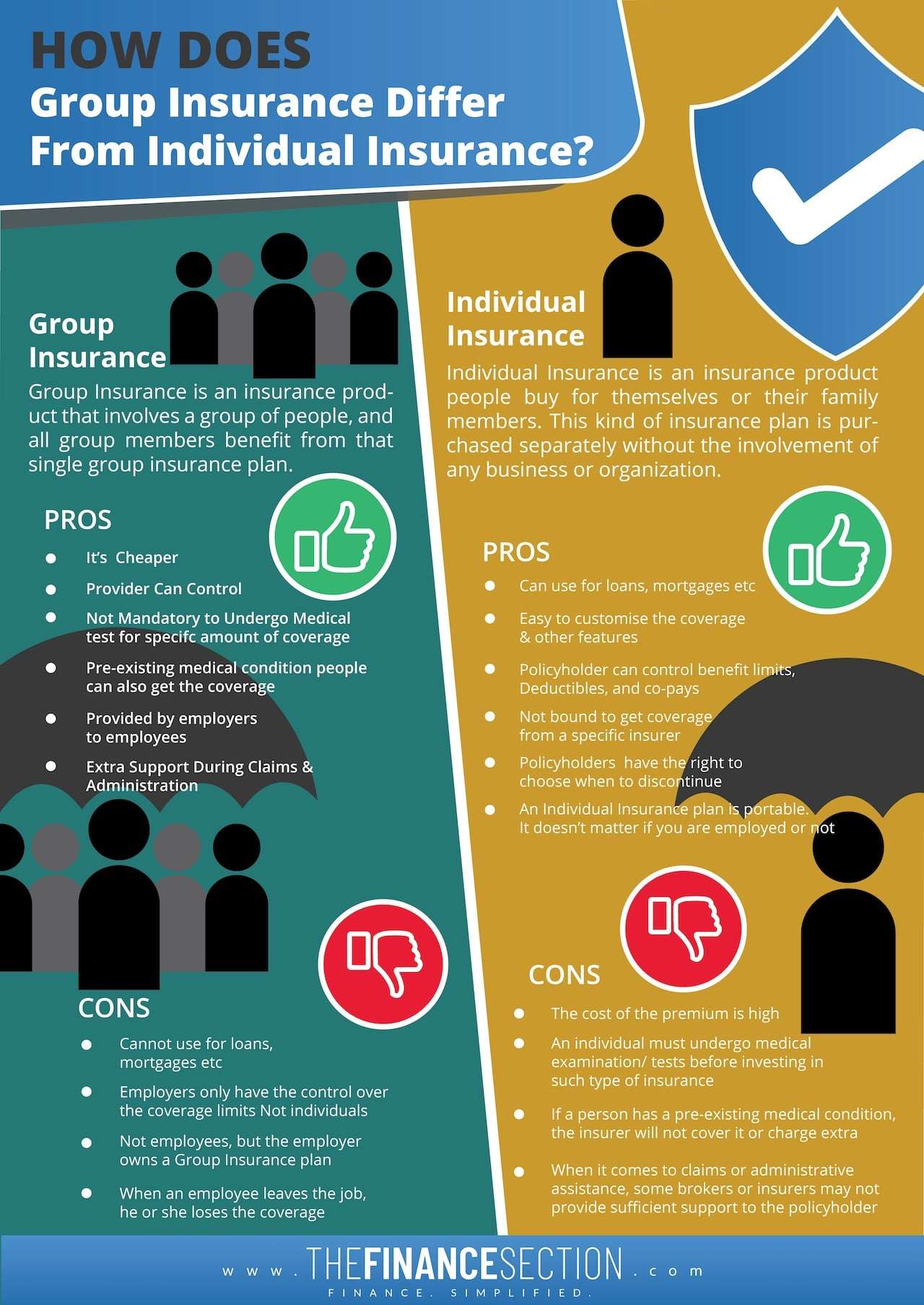If you want to run a successful business, you must provide your employees more than just salaries. A complete benefits package will work for you the most.
But, what all to include in that benefits package?
The comprehensive benefits package varies from business to business. It may include different types of insurance products, paid leaves, and other things. You can evaluate each of the benefits and find out whether it works in your favor or not.
Let’s start with insurance. This article is going to help you understand and find the difference between Group Insurance and Individual Insurance. In the end, there is a FAQ section containing answers to the most frequently asked questions about General as well as Individual Insurance.

Use this graphic for free, just source us with this link:
Source Link: https://thefinancesection.com/how-does-group-insurance-differ-from-individual-insurance/
Group Insurance
Group Insurance is an insurance product that involves a group of people, and all group members benefit from that single group insurance plan.
A group insurance product usually offered by a company for its employees is the group health insurance policy. There can be other possibilities also where a group of individuals is involved. For example, group travel insurance is a popular insurance product provided to a group of travelers.
How a Group Insurance Plan Works?
Group Insurance is a kind of employment benefit to employees. A business or organization either designs the group insurance plan itself or select from one of the already prepared policies by the insurance company.
When it comes to the functioning of group insurance plans, they all work almost similarly. The coverage provided to each member of the group is fixed and identical. To finalize the premium amount each group member has to pay, companies consider the collective risk those group members carry.
The logic insurance companies give is that some group members might not make a claim. It balances the risk factors, and all group members are covered identically.
A person gets insurance coverage until he or she is a member of the group. Once that person leaves the group, no insurance coverage is provided.
Advantages of Group Insurance
Some benefits provided by group insurance are:
- Whether it is about calculating and paying premiums or making claims, a group insurance policy is always easy to manage.
- All members of a group insurance policy get the same amount of coverage and benefits.
- Group insurance is relatively cheaper compared to other insurance products.
- When an employee is sick or meets an accident, his or her company is often liable to cover the expenses for treatment. A group insurance policy prevents the company from such a financial burden.
- If a person has an ailment before being one of the members of a group insurance policy, some insurance plans cover that also.
- A group insurance policy provides the tax benefit to companies and is advantageous to them while preparing the annual budget.
Individual Insurance
As the name suggests, Individual Insurance is an insurance product people buy for themselves or their family members. This kind of insurance plan is purchased separately without the involvement of any business or organization.
As compared to Group Insurance, the premium amount of an Individual Insurance policy is high. But the good thing is that an individual has more control over the insurance plan he or she is purchasing.
An Individual Insurance plan is usually more targeted to cover personal and specific needs. The most common version of Individual Insurance is Individual Health Insurance.
If a person works in an organization and thinks his insurance premium will be borne by the company, he might be wrong because it is not the company’s responsibility to pay for this type of insurance policy’s premium.
Moreover, Individual insurance provides freedom like no other insurance product. You can choose a lot of things like the type of coverage, duration of the policy, inclusion or exclusion of family members, and others.
How an Individual Insurance Plan Works?
This insurance product serves individuals and is customizable according to their needs and preferences. To determine the value of the premium, insurance companies consider individual’s specifications like age, family medical history, health, and other things.
The good thing with this kind of policy is that it is valid till the time policyholder wants it to remain in force. It doesn’t depend on other factors like his/ her job, association with the company, etc.
The insurance company decides a fixed premium amount when an individual purchases the policy, and it remains unchanged throughout the policy period. However, individuals can purchase riders (additional benefits) depending upon their needs.
Advantages of Individual Insurance
Some benefits provided by individual insurance are:
- An insurance plan for individuals takes care of their needs and preferences. A person can choose what fits his or her pocket.
- If a person wants the policy to cover dependent family members also, many insurance companies provide this facility.
- In individual insurance policies, the policyholder gets guaranteed coverage. A fixed amount of money covers the individual’s needs.
- With such a policy, you get individual tax benefits. The premium paid is not counted as part of your taxable income.
- When buying such a policy, if a person buys individual policies for his/ her family members also, most insurance companies give additional benefits and discounts to that person.
Difference Between Group Insurance and Individual Insurance
Both Individual or Group Insurance differ from each other not only in terms of advantages but also disadvantages. To understand the difference, let’s see the positives (pros) and negatives (cons) of both.
Group Insurance Pros
- Group Insurance provides coverage at low costs. In other words, it is cheaper than other insurance products.
- The provider (company/ business/ organization) of a Group Insurance policy can control and also cancel the coverage provided to group members.
- It is not mandatory to undergo medical examinations/ tests for a specific amount of coverage. For coverage beyond that amount, group members must undergo medical tests.
- If a group member has any pre-existing medical condition, he or she can also get the coverage.
- As group insurance is mostly provided by employers to employees, the insurance premium is taken directly from the salary.
- Group insurance companies sometimes provide corporate clients with additional benefits such as extra support during claims and administration.
Group Insurance Cons
- This insurance product provides cover to a group of individuals. You cannot use a group insurance policy for other purposes like loans, mortgages, etc.
- The employer, not individuals, sets the coverage limits and benefits a group insurance policy should provide.
- Not employees, but the employer owns a Group Insurance plan.
- When an employee leaves the job, he or she loses the coverage.
Individual Insurance Pros
- An Individual Insurance policy is in the policyholder’s name. He or she can utilize it as an asset for loans, mortgages, etc.
- When it comes to customizing the coverage and other features, individual insurance is better than other insurance products.
- An Individual Insurance policy allows the policyholder to control benefit limits, deductibles, and co-pays.
- Individual Insurance gives policyholders the right to choose when to discontinue the policy.
- The policyholder is not bound to get coverage from a specific insurer. A person is free to choose whichever provider suits him/ her the best.
- An Individual Insurance plan is portable. It doesn’t matter if you are employed or not.
Individual Insurance Cons
- The cost of the premium is high.
- If a person has a pre-existing medical condition, the insurer will not cover it or charge extra.
- An individual must undergo medical examination/ tests before investing in such type of insurance.
- When it comes to claims or administrative assistance, some brokers or insurers may not provide sufficient support to the policyholder.
Which is Better – Group Insurance or Individual Insurance?
It depends upon individuals which one they find better. Some people find value in Group Insurance, whereas others like the one for individuals.
The cost-effectiveness of Group Insurance plans votes in favor of businesses. However, it doesn’t allow individuals to choose what needs to be covered and what doesn’t. Based on your and your family’s medical history, you can’t decide the diseases or illnesses to include in the plan.
An Individual Insurance policy does not have such barriers. Its premium is high, but it gives enough freedom to the policyholder. It not only allows you to customize things related to coverage but also lets you add family members to the plan.
The life of a Group Insurance cover ends with your employment. If you switch the job, there is no surety that the new employer will provide you coverage. And, the setback with Individual Insurance is that you may not get a policy after retirement. If somehow you get it, the premium will be too high.
A close evaluation of these factors might influence your decision. However, experts suggest going for an individual policy even if your employer provides you coverage under the group policy.
Don’t forget that you have to research a lot and consult your financial/ insurance provider before making the final decision.
Frequently Asked Questions
After going through all this information, you might be having some questions in mind. Like you, many people have questions. Below are answers to some of the frequently asked questions about General Insurance and Individual Insurance.
1. Will the insurance company allow me to cover my family members also?
If you are covered under a General Insurance policy, you won’t get the coverage for your family members. However, this is not the case with Individual Insurance because many companies have plans that allow individuals to get their family members covered under the same policy.
2. Do I need to pay an extra fee while buying insurance through an insurance agent?
No, you don’t need to pay any extra fee while buying insurance through an agent. The insurance companies pay them commissions for every successful deal. The insurance agent will advise and assist you during the application process without asking for any additional fees.
3. Can the insurance company deny accepting my health insurance application?
In the case of Individual Insurance, the insurer can deny your application. There can be many reasons, but it usually happens when you don’t have an impressive medical record. Your pre-existing ailment becomes the basis for rejection.
In the case of General Insurance, many insurance companies provide you coverage even if you have a pre-existing disease or medical condition.
4. I am a smoker. Can I still get individual health insurance?
You can get an individual health insurance policy even if you smoke. However, your premium amount will be more than those of non-smokers, and you have to undergo some additional medical tests.
If you have to avail the premium equal to that of non-smokers, some insurance companies might ask you to stop smoking for at least a year.
5. Do the rates of individual health insurance vary according to age?
Yes, the rates change depending upon the policyholder’s age. It is because health-related risks also increase with age.
6. General health insurance provides tax incentives to the employer. Is it true?
Employees are not the only ones benefitting from group health insurance. Employers get a tax credit when they take care of their employees’ premiums.
7. I want to get individual health insurance. How can I know my eligibility?
The previous health record of a person determines whether he or she is eligible to get an individual health policy or not. If you do not know how the insurance company will find and evaluate your medical history, get in touch with a reliable health insurance broker or agent. Whether you are eligible or not, the agent will explain everything to you.
Final Words
Group Insurance and Individual Insurance are different from each other. Both have attractive as well as repulsive characteristics. It depends upon the individual which one he/ she likes. If you want to benefit from individual insurance, you can go for such a policy. And to get the benefits of General Insurance, make sure you are an employee somewhere.
Note:
- If your queries are not covered in this article, you can put it in the comments section below and get it answered by an expert.
- In today’s corporate environment, the terms Group Insurance and Individual Insurance are commonly used for Group Health Insurance and Individual Health Insurance. So, don’t get confused.

